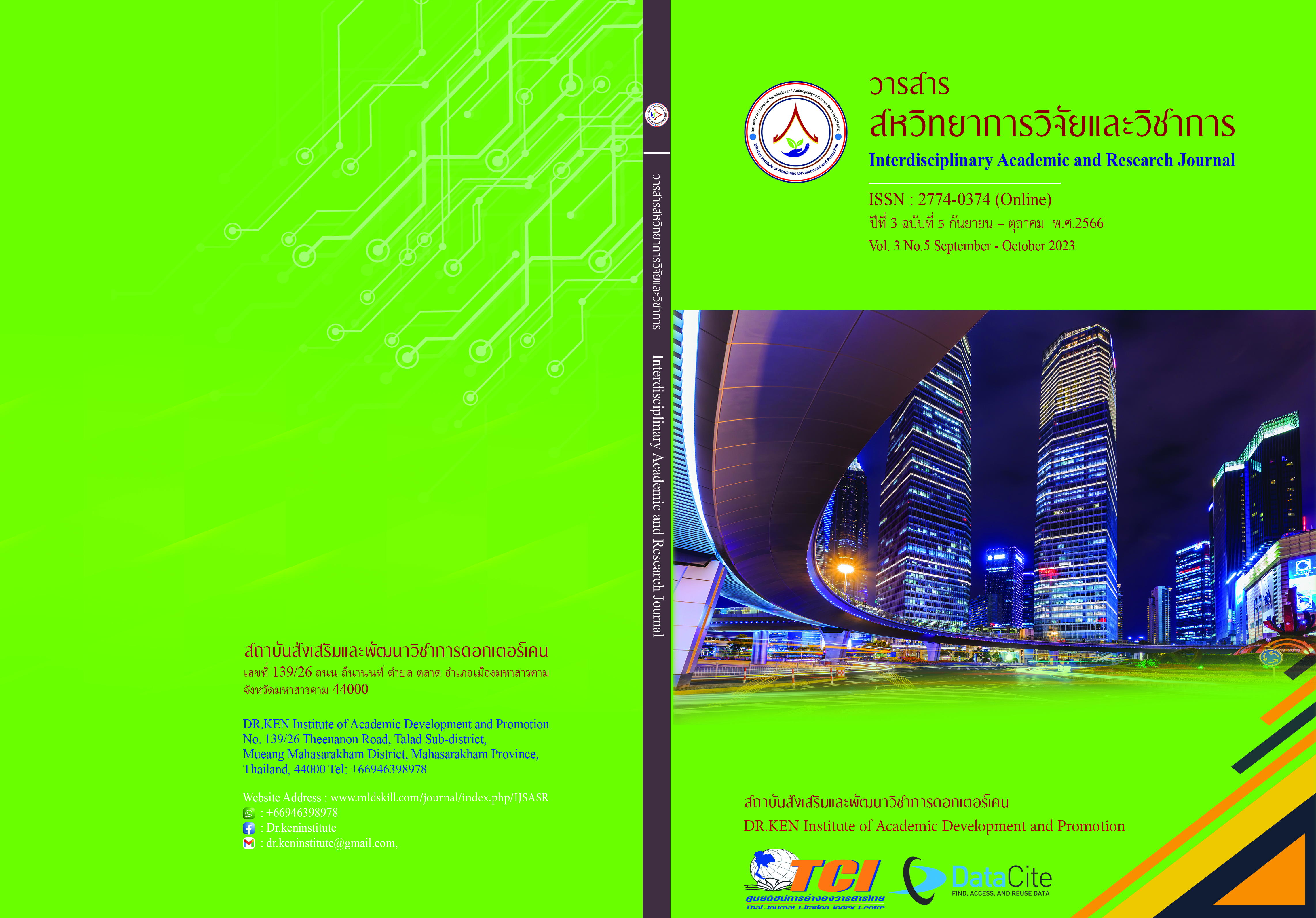The Process Causing of Collaboration the Academic Service Project College of Law and Government Sisaket Rajabhat University
DOI:
https://doi.org/10.14456/iarj.2023.286Keywords:
Process; , Collaboration Model; , Academic Service.Abstract
Academic service to society and community is one of the offensive lines concretely defined by providing academic service to the community from higher education institutions. In general, it focuses on promoting and opening up educational opportunities for people both inside and outside the teaching and learning system to increase educational equality and promote people's well-being. This academic paper aims to present the concept of the process that leads to the collaboration model of the Academic Service Project of the College of Law and Government. Sisaket Rajabhat University is a local higher education institution with the main mission of providing academic services that meet the needs of the local community by applying knowledge from curriculum development Teaching and learning management that is consistent with the context of the community and society. Including the knowledge gained from research or research to be used in providing academic services to the community. Integrate collaboration in academic service with local agencies. as well as build a strong network of academic cooperation, However, the implementation of academic service projects is comparable to the implementation of the organization's policies. The process of implementing such policies is therefore not limited to government organizations. and unilateral bureaucracy but also the private sector and the local communities involved in the process of cooperation. Knowing the collaboration process can lead to the presentation of a collaboration model as a guideline that will facilitate the development of an effective collaboration network.
References
จันทิมา องอาจ และคณะ. (2561). การบริหารจัดการการบริการวิชาการแก่สังคมของมหาวิทยาลัยราชภัฏสุราษฎร์ธานี. วารสารราชภัฏสุราษฎร์ธานี. 5(1), 276-277.
ดนุช ตันเทิดทิตย์ และสัมพันธ์ เย็นสำราญ. (2566). การถอดบทเรียนโครงการขับเคลื่อนเศรษฐกิจและสังคมฐานรากหลังโควิดด้วยเศรษฐกิจ BCG ประเทศไทย (U2T for BCG). วารสารชุมชนวิจัย มหาวิทยาลัยราชภัฏนครราชสีมา. 17(1), 26 - 27.
ปิยากร หวังมหาพร. (2563). การจัดการปกครองสาธารณะแนวใหม่ : มองผ่านนโยบายประชารัฐ. จุฬาลงกรณ์ มหาวิทยาลัย: กรุงเทพฯ.
พรธิดา วิเศษศิลปานนท์ (2561). การขับเคลื่อนความรับผิดชอบต่อสังคมของมหาวิทยาลัยที่มีผลต่อนักศึกษา. วารสารสาขามนุษยศาสตร์ สังคมศาสตร์ และศิลปะ. 12(2), 574 - 575.
สมศักดิ์ ศรีสันติสุข. (2565). เศรษฐกิจสีเขียวกับทุนทางวัฒนธรรม : การพัฒนาท้องถิ่นในยุคปกติวิถีใหม่. วารสารวิจัยวัฒนธรรม. 5 (1), 9-19.
เสาวลักษณ์ พันธบุตร. (2557). การให้บริการวิชาการแก่ชุมชน ของมหาวิทยาลัยศรีนครินทรวิโรฒ :กรณีศึกษา การพัฒนาชุดการสอนสำหรับการอบรมเชิงปฏิบัติการด้าน IT สำหรับครูโรงเรียนบ้านวังใหม่ อำเภอวังสมบูรณ์ จังหวัดสระแก้ว.วารสารสถาบันวัฒนธรรม และศิลปะ. 16(1), 106-107.
Agranoff, R. & McGuire, M. (2003). Collaborative Public Management: New Strategies for Local Governments. Washington DC: Georgetown University Press.
Bardach, E. (1998). The Implementations Game: What Happens After a Bill Becomes a Law. 3rd edition. Press: The MIT press
Coombs, P. (1981). New Strategic for improving ruled family life: International Council for Education Development. USA: Essex, CT.
Cramer, S.F. (1998). Collaboration. Booton, MA: Allyn & Bacon.
DuBrin, A., & Ireland, R. (1993). Management and Organization. 2nd edition. Ohio: South-Western Publishing Company.
Gray, B. (1989). Collaborating: Finding Common Ground for Multiparty Problems. San Francisco: Jossey-Bass Publishers.
Huxham, C. (1993). Pursuing collaborative advantage. The Journal of the Operation Research Society, 44(6), 500-611.
Lucas, J. (1998). Balance of Power. New York: AMACOM.
Selden, S. & Sandfort, J. (2002). The impact of nonprofit collaboration in early child care and education on management and program outcomes. Public Administration Review, 66(3), 412-425.
Downloads
Published
How to Cite
Issue
Section
License
Copyright (c) 2023 Prathana Malithai, Alonggote Phansanit

This work is licensed under a Creative Commons Attribution-NonCommercial-NoDerivatives 4.0 International License.
Copyright on any article in the Interdisciplinary Academic and Research Journal is retained by the author(s) under the under the Creative Commons Attribution-NonCommercial-NoDerivatives 4.0 International License. Permission to use text, content, images, etc. of publication. Any user to read, download, copy, distribute, print, search, or link to the full texts of articles, crawl them for indexing, pass them as data to software, or use them for any other lawful purpose. But do not use it for commercial use or with the intent to benefit any business.
















.png)


